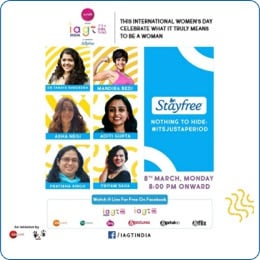Stayfree® knows that periods can be difficult.
That’s why Stayfree® has a long heritage of creating products that provide comfortable protection to help women feel at ease during their periods.

SANITARY NAPKINS
Stayfree® Dry-Max XL
Nearly 40% longer with Dry-Max Cover for best dry feel protection*
SANITARY NAPKINS
Stayfree® Secure XL Ultrathin
Half as thin* as a regular napkin with upto 100% Fluid Lock^
Period Basics: Know More
Everything Periods
What is a Period?
Getting a period is a natural and healthy process, when women shed their uterine lining. Learn how long a “normal” period lasts and how to manage period pain.
Everything Periods
Menstrual Cycle Stages & More
There are four phases within menstrual cycle and can last between 24 to 38 days. Let's get to know the way each phase can affect you with Stayfree® India.
Growing up
Having the period conversation with your daughter
Talk to your daughter that a getting period is normal and healthy. Here are some tips for talking to your daughter about menstruation cycle to break society stigma around period.






